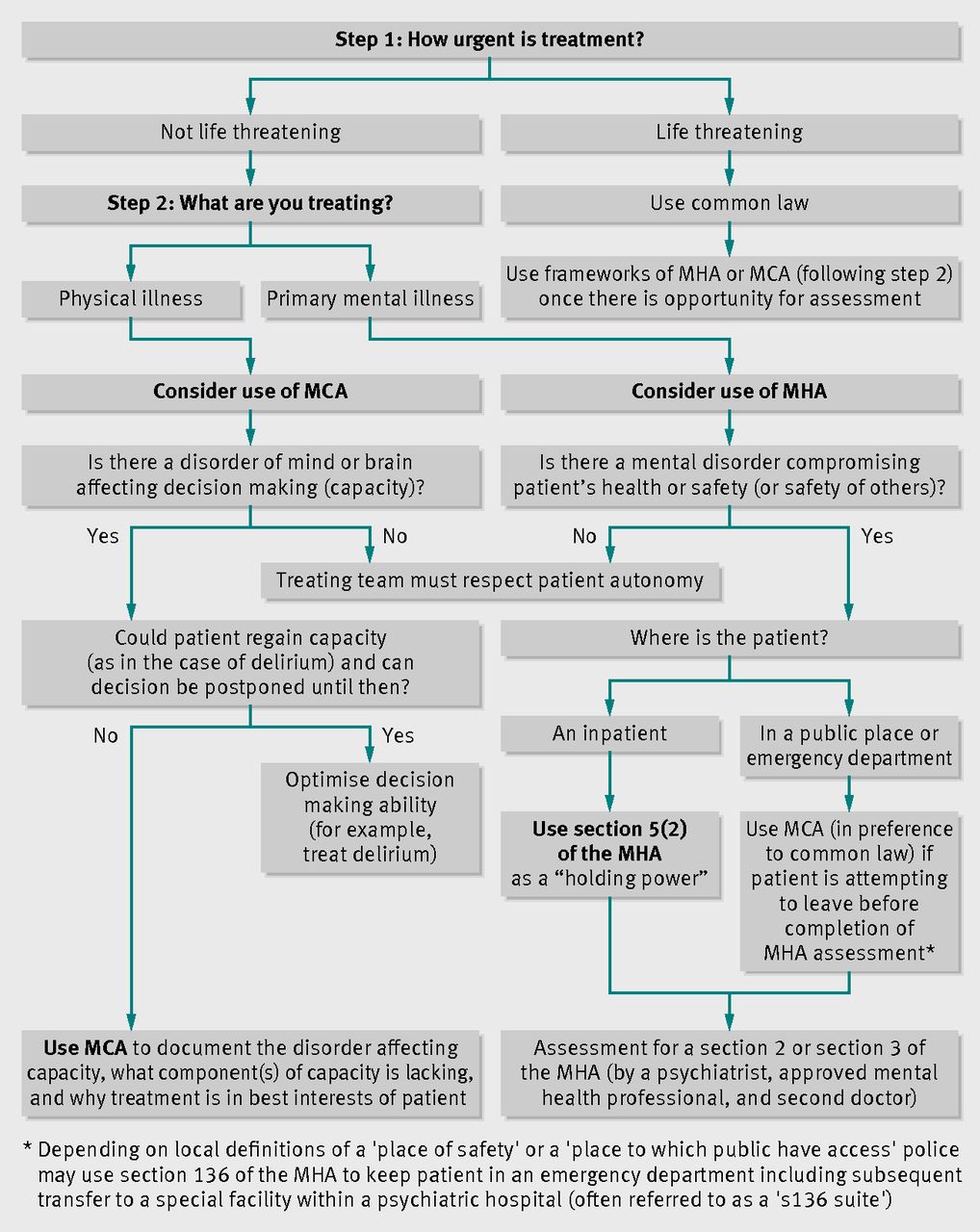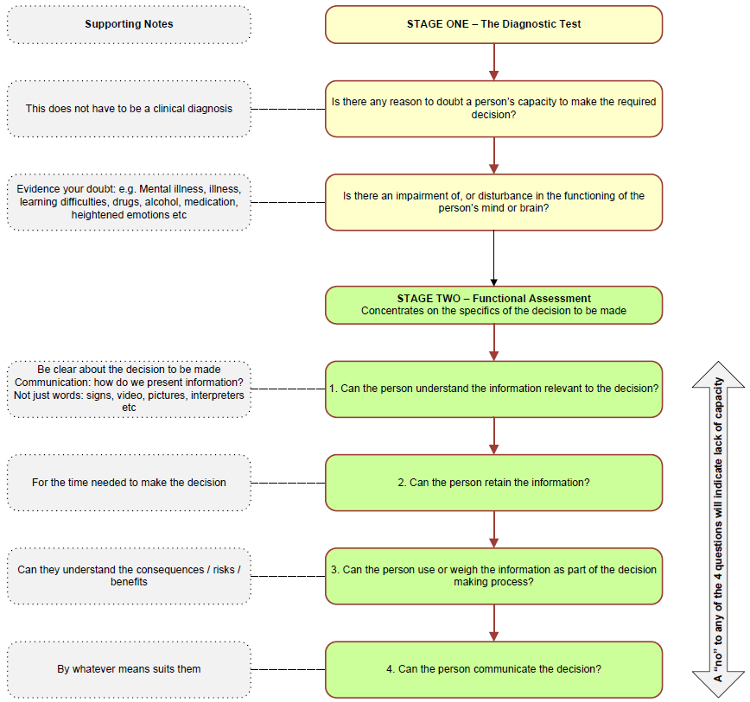Makindo Medical Notes"One small step for man, one large step for Makindo" |
|
|---|---|
| Download all this content in the Apps now Android App and Apple iPhone/Pad App | |
| MEDICAL DISCLAIMER: The contents are under continuing development and improvements and despite all efforts may contain errors of omission or fact. This is not to be used for the assessment, diagnosis, or management of patients. It should not be regarded as medical advice by healthcare workers or laypeople. It is for educational purposes only. Please adhere to your local protocols. Use the BNF for drug information. If you are unwell please seek urgent healthcare advice. If you do not accept this then please do not use the website. Makindo Ltd. |
Mental Capacity Act 2005
-
| About | Anaesthetics and Critical Care | Anatomy | Biochemistry | Cardiology | Clinical Cases | CompSci | Crib | Dermatology | Differentials | Drugs | ENT | Electrocardiogram | Embryology | Emergency Medicine | Endocrinology | Ethics | Foundation Doctors | Gastroenterology | General Information | General Practice | Genetics | Geriatric Medicine | Guidelines | Haematology | Hepatology | Immunology | Infectious Diseases | Infographic | Investigations | Lists | Microbiology | Miscellaneous | Nephrology | Neuroanatomy | Neurology | Nutrition | OSCE | Obstetrics Gynaecology | Oncology | Ophthalmology | Oral Medicine and Dentistry | Paediatrics | Palliative | Pathology | Pharmacology | Physiology | Procedures | Psychiatry | Radiology | Respiratory | Resuscitation | Rheumatology | Statistics and Research | Stroke | Surgery | Toxicology | Trauma and Orthopaedics | Twitter | Urology
Related Subjects: |Dementias |Abbreviated Mental Test Score (AMTS) |Alzheimer disease |Dementia with Lewy bodies |Frontotemporal dementia |Corticobasal degeneration |Creutzfeldt Jakob disease |Vascular Dementia |Primary progressive aphasia |Anti Dementia Drugs |AIDS Dementia Complex |Normal Pressure Hydrocephalus |Acetylcholinesterase inhibitors |Mental Capacity Act 2005 |Behavioural and Psychological Symptoms of Dementia
🧠 Mental capacity can vary depending on the decision and the timing. A patient may be able to decide what to eat 🍽️ but not whether to move into a care home 🏠. Capacity should always be assumed unless proven otherwise.
📖 About
- The Mental Capacity Act (MCA, 2005) protects and empowers people who may lack the mental capacity to make their own decisions about care and treatment.
- Applies to people aged 16+ in England and Wales.
- Covers both everyday choices (e.g. shopping, clothing) and serious life-changing decisions (e.g. surgery, care home placement).
- Examples of people who may lack capacity include those with:
- Dementia 🧓
- Severe learning disability 📘
- Brain injury 🧠💥
- Mental illness
- Stroke 🫀
- Temporary unconsciousness (e.g. anaesthesia, trauma)
🧾 Five Key Principles
- 1. Presumption of Capacity: Assume every adult has capacity unless proven otherwise.
- 2. Support to Decide: Provide all practical help to support decision-making.
- 3. Unwise Decisions: People have the right to make eccentric or “unwise” choices without being deemed incapable.
- 4. Best Interests: Any act/decision on behalf of someone lacking capacity must be in their best interests, involving them as much as possible.
- 5. Least Restrictive Option: Choose options that interfere least with the person’s rights and freedoms.
📊 MCA in Practice


👥 Independent Advocate
- People can state preferences for future care or appoint a Lasting Power of Attorney (LPA).
- An independent advocate must be provided in serious treatment or major restriction of liberty cases.
✅ What Counts as Capacity?
- Ability to understand the nature, purpose, and effects of the decision.
- Can understand consequences of agreeing/refusing.
- Can retain, weigh, and believe relevant information.
- Can communicate a choice (verbally, writing, or otherwise). Severe dysphasia may impair this.
🔎 MCA Two-Stage Test
- Does the person have an impairment of mind/brain (illness, injury, intoxication)?
- Does this impairment mean they are unable to make the specific decision at the required time?
👉 Capacity can fluctuate. Always consider whether delaying the decision might allow capacity to return.
🚫 A person is considered unable to decide if they cannot:
- Understand information relevant to the decision.
- Retain that information long enough to decide.
- Weigh up pros and cons.
- Communicate their decision.
⚖️ Best Interests Checklist
- Use the least restrictive approach possible.
- Take account of the person’s past and present wishes, beliefs, and values.
- Consult family, carers, and those close to the person.
- Avoid discrimination or assumptions.
- Delay decision if capacity may improve.
📚 References
Cases — Mental Capacity Act 2005
- Case 1 — Refusing treatment 🩺: A 68-year-old man with severe pneumonia refuses IV antibiotics, saying “I don’t believe in medicine.” You assess: he understands the information, can weigh risks, and communicates clearly. Although the decision seems unwise, he has capacity under the MCA. His choice must be respected. Teaching: MCA protects the right to make unwise decisions if capacity is intact.
- Case 2 — Delirium and urgent decision ⚡: A 75-year-old woman with urosepsis is acutely delirious and pulls out her IV cannula, saying “Get away!” You assess: she cannot understand or retain information about her infection. She therefore lacks capacity for this decision at this time. Under MCA best-interests principle, you treat her with IV antibiotics, using the least restrictive option.
- Case 3 — Advance decision & life-sustaining treatment 📜: A 59-year-old man with motor neurone disease has a valid, written, and signed advance decision refusing invasive ventilation if he deteriorates. He is now unconscious with respiratory failure. Under the MCA, this advance decision is legally binding, provided it is applicable to the current circumstances. The team should respect his advance refusal and provide palliative care instead.
Teaching Point 🧠: The MCA (2005) is built on 5 principles: assume capacity unless proven otherwise, support decision-making, respect unwise decisions, act in best interests, and choose the least restrictive option. Capacity is decision-specific and time-specific.